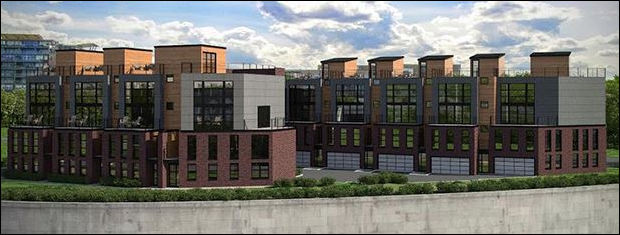
Proposed 7west project.
Jeremy Connell wants to build a dozen high-end townhomes in Manchester, right across the James River from downtown. The $6 million, 7west project envisions four-bedroom, three-story townhouses priced in the $700,000s, providing a nice boost to the City of Richmond’s tax base and offering a short, easy commute to the region’s central business district.
He originally hoped to begin construction in April of 2016. Four months later, when demolition began, he revised the timetable to September. Yet today, 16 months later, work has not proceeded beyond the foundation-laying stage, reports Richmond BizSense.
The City of Richmond is experiencing an unprecedented boom as a wave of Millennials, empty nesters, and corporations move into downtown and surrounding neighborhoods. There is enormous pent-up demand to live and work in the amenity-rich city, with its walkable streets, historic buildings, museums and cultural institutions, and its canals and James River parks. But there’s a hitch. The city’s building inspectors can’t keep up. Writes BizSense:
“It is by far the worst it has ever been to get a project developed in the city of Richmond,” said Connell, who has been developing in the city for 15 years.
“The process is undermanaged, understaffed and overwhelmed,” Connell said. “It’s a bad three-way combination that retards development in the city.”
According to BizSense, Connell’s experience is frustratingly common. Doug Murrow, in charge of permits and inspections, attributes the delays to departures and vacancies that left the department temporarily short-staffed. Other observers quoted by BizSense (in a very well-sourced article, by the way) say the problems run deeper. The city has been slow to embrace new digital-permitting technology that would speed the process.
“The culture in Room 110 has been: this is the way we’ve always done it, this is the way we’re always going to do it,” says Charlie Diradour, a local landlord and developer. Diradour says that he hopes that the new mayor, Levar Stoney, will break the logjam.
For his part, Stoney says he is looking to neighboring Henrico County to see how the city might perform better. “We are suffering from staffing issues,” he told BizSense. “I wish we had the numbers that our friends in Henrico have: at least 70-plus people working on commercial and residential permitting. But we don’t have those numbers here. I know that the departments are doing everything they can to keep up with the uptick, but we can always do better.”
Bacon’s bottom line: In theory, core urban jurisdictions like Richmond should be kicking suburban butt in the race for development dollars. While Richmond clearly is rebounding, urban renovation is not occurring as rapidly as it could. In the past I have focused mainly on the zoning code as a throttling force. When Richmond could still annex country land a half century ago, it adopted a suburban zoning code that restricted denser, mixed-use development — precisely the kind of development the market wants to see. City Council has finally addressed that problem, especially in the Broad Street corridor (see “Richmond’s New Growth Corridor.”) But the city hasn’t fixed its permitting bottleneck.
In the competition for development, the City of Richmond enjoys immense advantages over its suburban neighbors, Henrico and Chesterfield Counties. But the counties do have one competitive edge — efficient government administration. The hassle factor is much lower. As Diradour told BizSense, contractors have told him that they add a point or two to their overhead when they do business in Richmond to account for the inevitable delays.
I don’t know if other cities have similar problems. BizSense suggests that the City of Roanoke has moved to a more efficient digital permitting process. Regardless, Richmond better get its act together, or it could squander a historic opportunity to rejuvenate itself.


